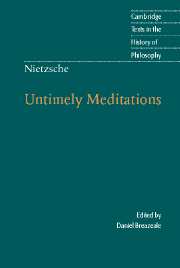Book contents
- Frontmatter
- Contents
- Introduction
- Chronology
- Further reading
- Note on the text
- Untimely Meditations
- David Strauss, the Confessor and the Writer
- On the Uses and Disadvantages of History for Life
- Schopenhauer as Educator
- Richard Wagner in Bayreuth
- Glossary of names
- Notes
- Index
- Cambridge texts in the history of philosophy
Schopenhauer as Educator
Published online by Cambridge University Press: 05 June 2012
- Frontmatter
- Contents
- Introduction
- Chronology
- Further reading
- Note on the text
- Untimely Meditations
- David Strauss, the Confessor and the Writer
- On the Uses and Disadvantages of History for Life
- Schopenhauer as Educator
- Richard Wagner in Bayreuth
- Glossary of names
- Notes
- Index
- Cambridge texts in the history of philosophy
Summary
A traveller who had seen many lands and peoples and several of the earth's continents was asked what quality in men he had discovered everywhere he had gone. He replied: ‘They have a tendency to laziness.’ To many it will seem that he ought rather to have said: ‘They are all timid. They hide themselves behind customs and opinions.’ In his heart every man knows quite well that, being unique, he will be in the world only once and that no imaginable chance will for a second time gather together into a unity so strangely variegated an assortment as he is: he knows it but he hides it like a bad conscience – why? From fear of his neighbour, who demands conventionality and cloaks himself with it. But what is it that constrains the individual to fear his neighbour, to think and act like a member of a herd, and to have no joy in himself? Modesty, perhaps, in a few rare cases. With the great majority it is indolence, inertia, in short that tendency to laziness of which the traveller spoke. He is right: men are even lazier than they are timid, and fear most of all the inconveniences with which unconditional honesty and nakedness would burden them.
- Type
- Chapter
- Information
- Nietzsche: Untimely Meditations , pp. 125 - 194Publisher: Cambridge University PressPrint publication year: 1997
- 23
- Cited by

